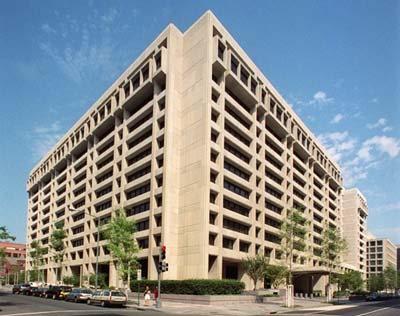Recession tightens its grip on Europe, IMF report says
 Berlin/Washington - Europe is facing a sharp slump in growth this year, the International Monetary Fund said Wednesday, led by a dramatic 5.6-per-cent contraction in its biggest economy, Germany, and resulting in a surge in unemployment.
Berlin/Washington - Europe is facing a sharp slump in growth this year, the International Monetary Fund said Wednesday, led by a dramatic 5.6-per-cent contraction in its biggest economy, Germany, and resulting in a surge in unemployment.
With global trade shrinking and the world economy gripped by recession, the IMF slashed its 2009 growth forecast for the 16-member eurozone by another 1 per cent to 4.2 per cent with the currency bloc managing to pull back to a 0.4-per-cent decline in 2010.
The IMF's latest World Economic Outlook underscores the risks that the economic crisis is rapidly turning into a labour market crisis, with eurozone unemployment set to rise this year to 10.1 per cent before edging up to 11.5 per cent in 2010.
This is despite the massive stimulus packages introduced by European governments and the number of companies across Europe placing employees on short-term working contracts rather than launching lay offs. The eurozone jobless rate stood at 7.6 per cent in
2008.
"The euro area is coming out of this crisis somewhat later than the US because to some extent the policy stimulus kicked in later," IMF economist Jorg Decressin told reporters in Washington.
But the IMF said Germany's government still had more room for manoeuvre because of sound fiscal policies in the past, and should be spending extra public funds to make up for the massive decline in exports.
"Could they do more? The answer is yes," Decressin said. "This is a case where a country has done its homework during the good times ... and can take advantage of this during the bad times."
Hopes had been raised last year that Europe might be able to escape the worst of the global recession triggered by a meltdown in the US housing market.
"However, financial systems suffered a much larger and more sustained shock than expected," the IMF report said, "macroeconomic policies were slow to react, confidence plunged ... and global trade plummeted."
The release of the IMF report comes amid signs of cautious optimism from around the world that the downturn could be starting to plateau out with hopes rising that the world economy could start to stage a recovery by the end of the year.
That said, the IMF report is likely to add to the pressure on the European Central Bank to forge ahead with its rate-cutting cycle.
Moreover, the reversal of economic growth in eurozone has meant that emerging European economies have suffered more from the downturn than emerging economies in Asia, the IMF said.
Consequently, the IMF predicts overall economic growth in emerging European economies, including Central and Eastern Europe as well as Turkey, to shrivel by 3.7 per cent this year before rebounding modestly by 0.8 per cent in 2010.
Falling oil revenue and the bleak global economic outlook means that growth in Russia will tumble by 6 per cent this year, the IMF said, reversing last year's 5.6-per-cent growth rate.
However, combined with dwindling energy and food costs, the economic slowdown has helped to undercut inflationary pressures, which have plagued parts of emerging Europe in recent years.
The IMF expects consumer prices in emerging Europe to fall from 8 per cent last year to 4.2 per cent next year.
But the Washington-based IMF also warned that Europe needed to be on its guard to deal with states in the region facing financial difficulty.
With this in mind, the IMF said there was "an urgent need to build new or enhance existing European Union schemes for mutual assistance so as to facilitate a rapid, common response to emerging payment difficulties."
As the world's leading export nation, Germany now appears to be bearing the brunt of the global recession, with the IMF saying unemployment in the country could climb to 10.8 per cent in 2010 from 9 per cent this year. Germany's jobless rate was 7.3 per cent last year.
But it was a picture repeated across Europe, with the IMF saying France faced a 3-per-cent fall in growth in 2009 and a meagre 0.4 per cent pickup next year, while Italy's GDP should sink by 4.4 per cent this year.
Britain, which has been battling with falling consumer demand, a housing market collapse and a drawing in of its key financial sector, is expected to stage only a modest recovery from this year's 4.1-per- cent contraction in its economy.
The IMF predicts British unemployment to jump from 7.4 per cent in 2009 to 9.2 per cent next year.
Particularly badly hit by the world recession and the credit crunch, Ireland's economic growth will fall by a disastrous 8 per cent this year and by 3 per cent in 2010, the IMF predicted after a collapse in the nation's construction boom. (dpa)